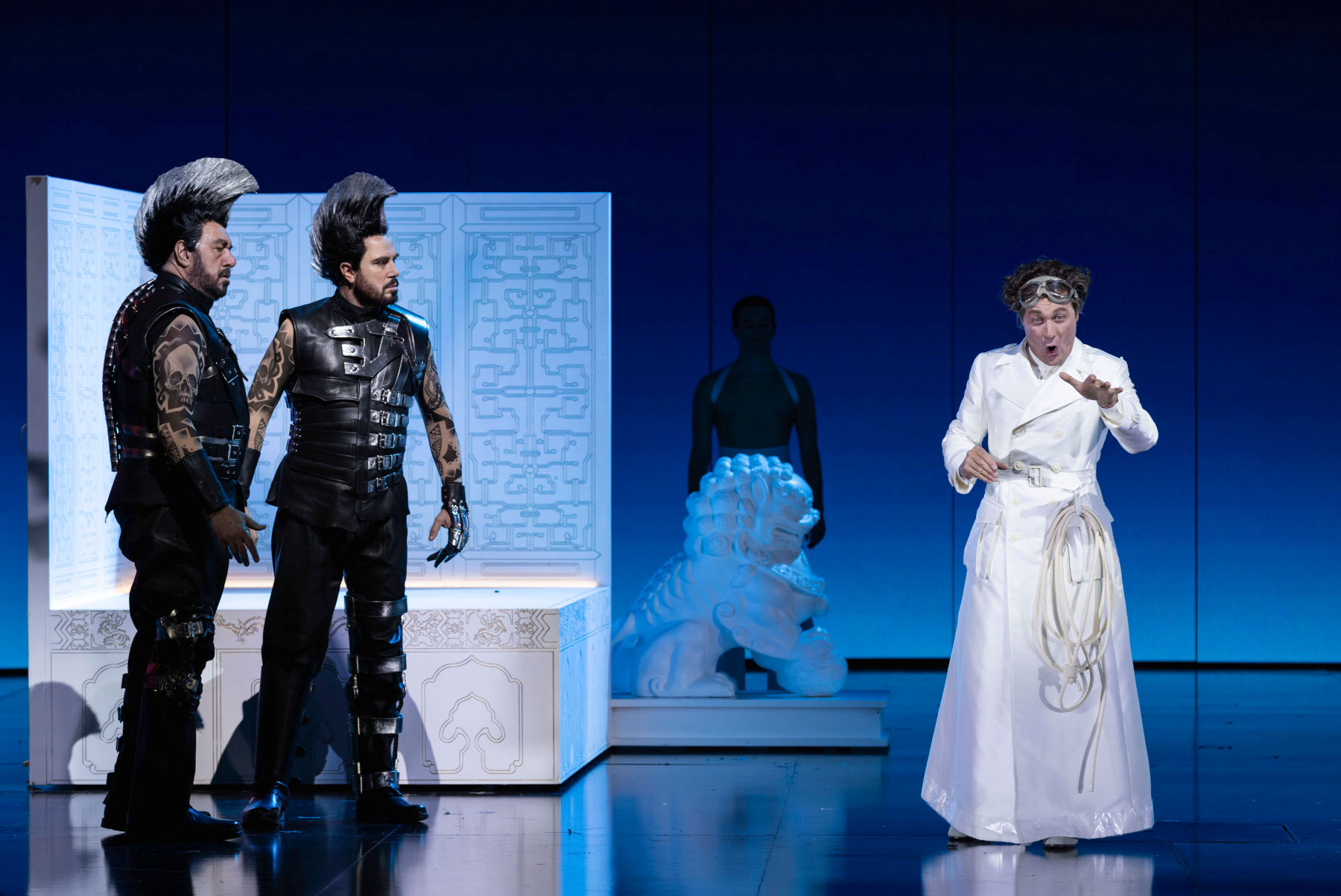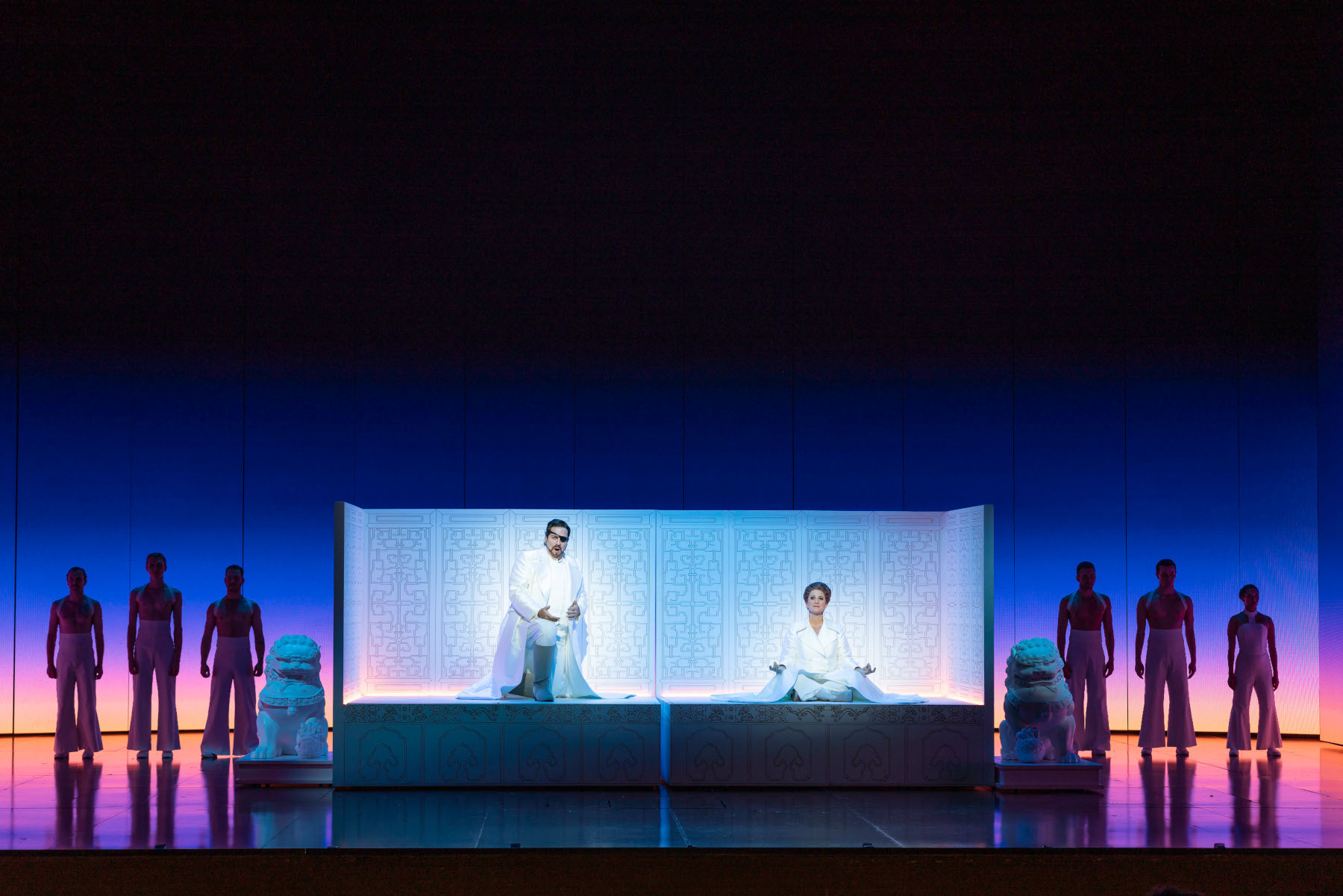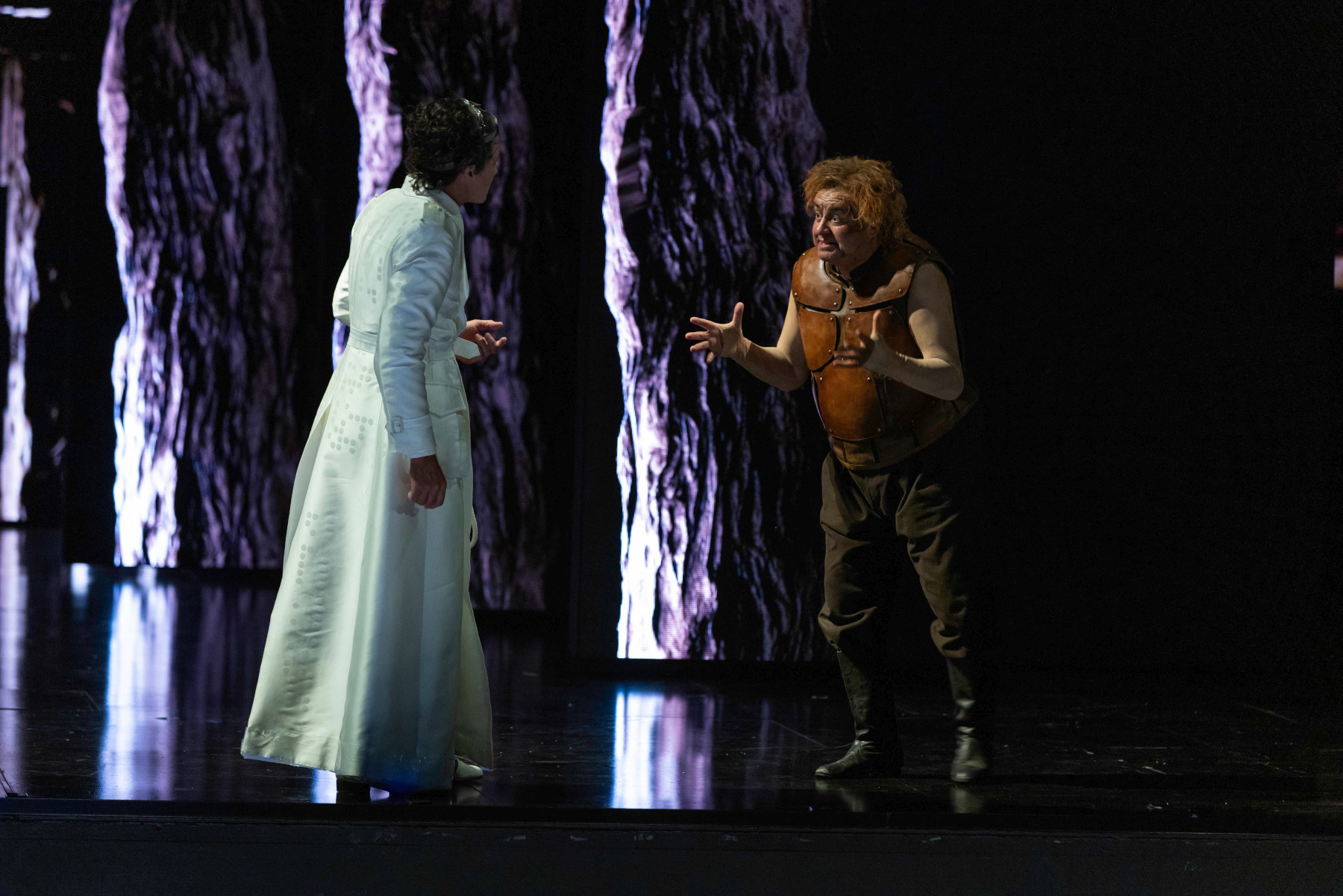Having been postponed in both 2020 and 2021 due to the global pandemic, Opera Australia’s much-publicized new “digital” Ring Cycle finally opened Friday evening. And it couldn’t have been more eventful, with an almighty storm slamming the city as patrons arrived for an immersion in the first installment of Richard Wagner’s 4-part epic, Das Rheingold.
So it was, with some amusement, that a sheet of digitally rendered rain falling across a projection of the opera’s title signaled the beginning of The Ring’s “preliminary evening” as the first mysterious but settling, droning bars emanated from the pit.
Germinating from former OA Artistic Director Lyndon Terracini’s idea of a digital, game-changing type of “Chinese Ring Cycle”, Chinese-born New York-based director and production designer Chen Shi-Zheng’s first touch may very well reference rain as a symbol of good luck in China (though not for some soaked opera-goers). With the rain transforming into lines spelling the title translated into many languages, Chen certainly hints at the work’s universality.

When the curtain rises, a magical underwater realm is created with seductive digital imagery. The three Rhine-maidens (lusciously sung by Lorina Gore, Jane Ede and Dominica Matthews) pop up and frolic, precisely timed with doubles so as to believe it is they who cross-cross the waters in aquatic, acrobatic awe while stirring up digital trails. The results are stunning — part of the digital content that will define this Ring by chief designer Leigh Sachwitz and her team at Berlin-based flora&faunavisions — and entertains a likelihood that Chen’s interpretation will honor the text of Wagner’s sprawling opus.
Alberich, in a standout performance from Warwick Fyfe, is a bearded, bulbous thorax-encased being and, when first encountered, appropriately lecherous. Thereon, all the elements are revealed just as they read without any deviation into esoteric territory. A large central set-piece alluding to coral becomes a golden nugget from which Alberich steals the gold. The all-powerful ring Alberich forges is, unsurprisingly, a ring. The tarnhelm is a credible device in the form of an expandable gold disc. Wotan, noble and subtly commanding in the hands of Daniel Sumegi, carries a scalpel-like spear and so on. Chen’s literal approach befits Wagner’s mythological story of the repercussions of power and greed, accompanying it with a world he refers to as “modern science fiction” and it being “equivalent to ancient mythology”. Yes, Chen makes a valid analogy and, tied to modern technology, the progressive Wagner (and Wagnerites) might very well give a supportive view on it.
Pinpointed time and place is irrelevant as Chen aims to create his multiverse, highlighted by Wotan and Loge’s descent from the Chinese imperialist-inspired minimalism of one room in the gods’ realm via a glowing hot tunnel into Alberich’s subterranean mine of Nibelheim and exiting via some kind of galactic time-altering imagery to another similar room elsewhere in space. It’s not entirely clear why.

Those god-dwelling spaces could have been better differentiated but the final ascent to Valhalla does, however, achieve a sense of grandeur and achievement mixed with celebration few productions explore. Incorporating Akasia Ruth Inchaustegui’s Asiatic-inspired massed choreographed routine pumped with the energy of American showbiz while a circuitboard-like set of hybrid Eastern and Western geometric patterns dazzle on the multiple lofty maneuverable screens, Das Rheingold concludes, like its beginning, with stagecraft panache.
Throughout, the gods in their long white silken coats exude a sense of privilege and righteousness, the giants Fasolt and Fafner are a curious pair of thuggish mohawk-hairstyled punks in leather with David Parkin and Andrea Silvestrelli giving them fabulously impactful voice and form. But costume designer Anita Yavich’s pièce de résistance is the gown of twisted roots that make Erda one with the earth she is goddess of and part of an artistically devised moment as she rises from under the stage, a statuesque and composed Liane Keegan who could, however, project with greater power.

Hubert Francis’ vocally animated, cunningly diplomatic Loge is an utter joy to watch and listen to all the way to his final, somewhat prescient remarks. Other roles are captured impressively, including Andreas Conrad’s excellent, squealing and cowering Mime who, together with Fyfe’s Alberich and Francis’ Loge, form a trio of uniquely dynamic personalities. Deborah Humble exudes staunchness and refinement in tandem with her strongly sung Fricka, Mariana Hong is a crystal-voiced youthful Freia, Dean Bassett picks up the pace as a clean-cut Froh and Alexander Sefton is a notably striking presence with his brawny, quick-tempered Donner.
Musically, conductor Philippe Auguin anchors the drama with an overall sense of secure control with tempi astutely measured and textured despite glints of orchestral detail and intensity of volume being sometimes wanting. Nevertheless, as time passed, particularly from Nibelheim’s departure, the tremendous depth and power resonated enough to put firm trust in the Queensland Symphony Orchestra to carry off a remarkable cycle ahead.
At this point’s two-and-a-half-hour journey into the cycles’s more than 15 hours of music drama, despite an array of sophisticated digital content and its judicious use, Chen’s multiverse is not helped by areas of underdeveloped direction, particularly of the gods. Chen does, however, impart with clarity the well-wrought, defining transition as powers come head to head in this macro view of events that drive the main dramas of the cycle.
Chen’s promise of universality seems partly shortchanged by the use of thinly applied intercultural influences which, perhaps stating harshly, count for little. But in raising questions as to where it will head, the next episode of the universe is still much eagerly anticipated.
Paul Selar
Top Image: Lorina Gore as Woglinde, Jane Ede as Wellgunde and Dominica Matthews as Flosshilde in Opera Australia’s 2023 production of Das Rheingold at QPAC
Photo Credit: Wallis Media